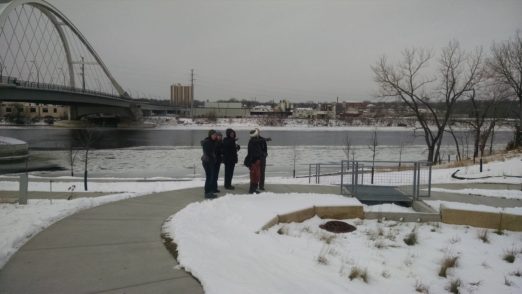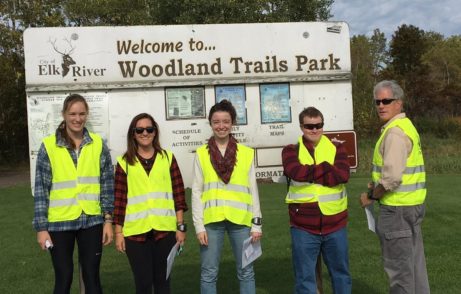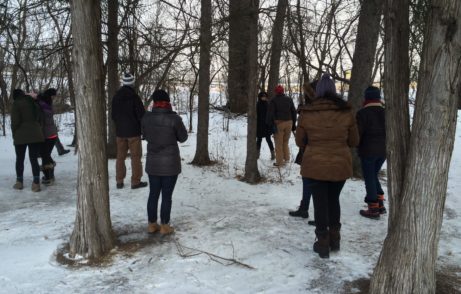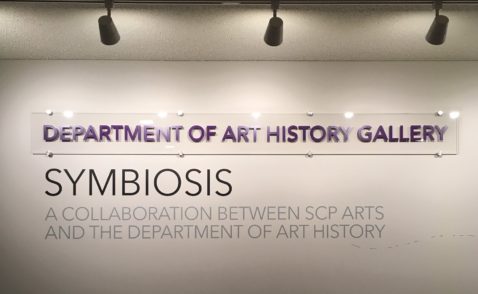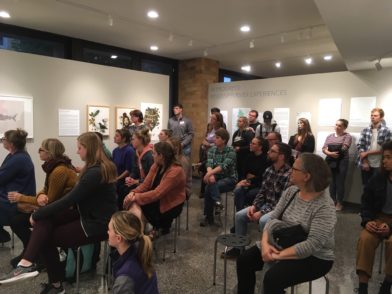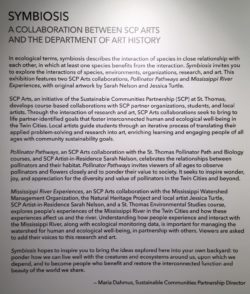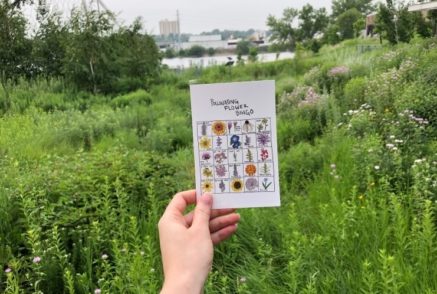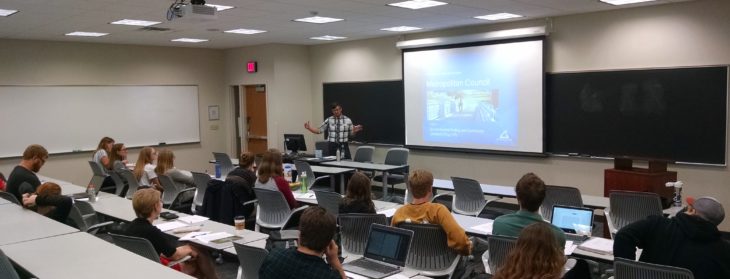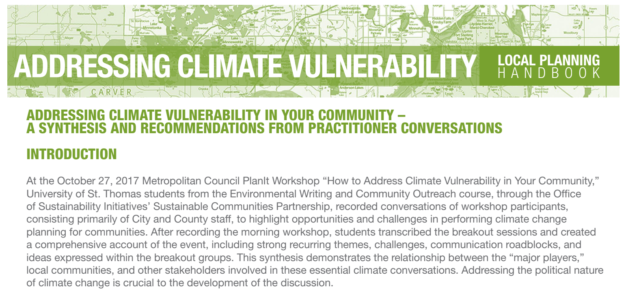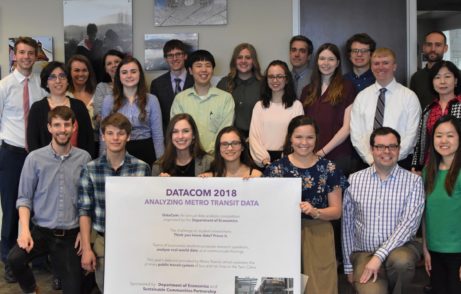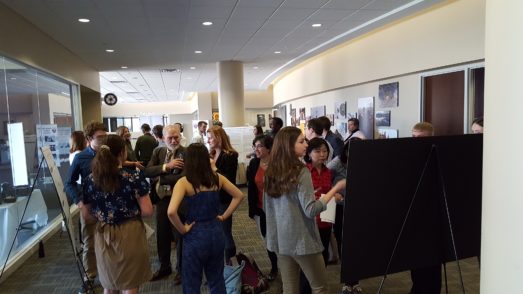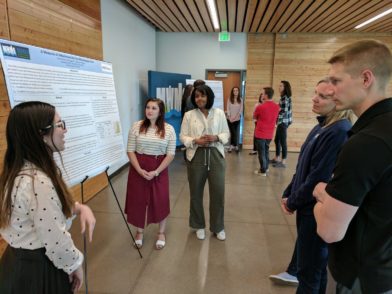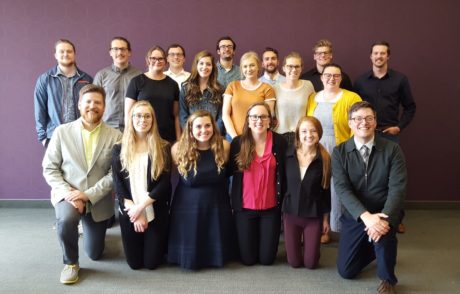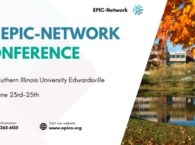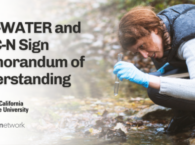University of St. Thomas – 2020 Outstanding Program Award Winner

Undergraduate Civil Engineering students with SCP partner PLACE
Sustainable Communities Partnership program at University of St. Thomas is the 2020 Outstanding Program winner!
Every year, EPIC-N celebrates outstanding contributions by university programs and community partners through the 2020 EPIC-N awards.
About the Award Winning Program
The Sustainable Communities Partnership (SCP) in the Office of Sustainability Initiatives partners with cities, government agencies, and campus initiatives to integrate partner-identified sustainability projects into St. Thomas courses across disciplines.
SCP partners primarily with small to medium-sized cities and governmental entities (including watershed districts and regional planning and transit agencies) in the Twin Cities Metro area. SCP also partners with non-profits that work directly with government partners on urban sustainability questions.
SCP projects are mutually beneficial, engaging students in real-world, applied research and innovative problem-solving while advancing partners’ interconnected economic, social, and ecological sustainability goals. Projects expand partners’ capacity to address long-standing and emerging sustainability issues that they may not otherwise have the time or resources to investigate themselves.
Since Spring 2016, SCP has collaborated with communities on over 120 projects with courses across 25 different disciplines to improve the quality of life in the Twin Cities area.
“The City of Elk River was excited to partner with the University of St. Thomas Sustainable Communities Partnership because classes have helped achieve initiatives that we wouldn’t be able to accomplish ourselves for years, if ever. We also get to aid the next generation of university students in gaining real-world expertise. It’s a win-win and we couldn’t be more honored for the opportunity.”
Kristin Mroz, City of Elk River, Environmental Technician
Supporting Faculty and Students
SCP has developed flexible and adaptive partnership development and project scoping processes to support faculty, students, and partners and to reduce barriers to partnership participation.
SCP adapted the EPIC Model to partner with multiple cities over multiple years. This allows SCP to create a significant impact at a pace that is feasible for small cities and government agencies and to adapt to partners’ changing capacity for projects over the partnership timeframe. The multi-year partnerships also increase the depth of relationships with partners and enable courses across disciplines to build on projects over time.
SCP primarily works with undergraduate courses. SCP collaborates with partners and faculty to adapt projects to the various levels, opportunities, and constraints of courses across disciplines. For example, projects are integrated into introductory to capstone courses, ranging in scope and scale from short units to semester long projects. Regardless of the topic and scope, SCP project scoping ensures that the project:
- Enriches course learning objectives through real-world application of course content
- Is at a level and scale appropriate for the course and time constraints
- Is logistically feasible (e.g., confirming background information, data, access to sites, etc. needed to complete the project)
- Advances the partner’s sustainability goals.
SCP writes the project scopes after the collaborative discussions to ensure mutual understanding and expectations for the project and to further support faculty and partners. Throughout the project, SCP provides problem-solving and logistical support, as well as continued partnership development.
Faculty and partners recommend the SCP program to their colleagues as an enriching, focused, and creative way to engage students in applied, real-world problem-solving, enrich learning, and advance community sustainability goals.
Faculty value the partnership and project development role SCP offers. For example, one faculty member stated that: “Projects are engaging and exciting … SCP makes these projects easy to integrate into my course.” Faculty members have also noted that the collaborative nature of the projects enlivens their teaching. For example, one faculty member noted that the SCP project “gave me a chance to truly act as a coach rather than a judge.”
SCP’s partners also value the intentional flexibility built into the partnership structure to propose a diverse range of projects at various scopes and scales to achieve their sustainability goals. After SCP’s pilot year, all subsequent SCP partners have reached out to SCP to develop a partnership because of either colleague referrals or from learning about the program on podcasts or the website.
SCP received an Honorable Mention for the Commuter Choice Award, which “recognizes programs and projects that improve commuter mobility in the Twin Cities.”
SCP’s partners also welcome the opportunity to work with college students and the perspectives they bring to the questions of sustainability.
Students value the real-world experience that SCP projects provide, with about 90% of students reporting that they would recommend a course with an SCP project to their peers. The top skills students report developing through SCP projects include:
- Applying course concepts
- Solving complex problems
- Critical thinking
- Understanding real-world problems
- Presentation
- Communication
- Collaboration and teamwork
Students also report that citing their SCP project work on their resume and in job interviews has helped them get a job.
“The research and work put in by the students on these projects are of immense value to Metro Transit. As a public entity, we have limited resources. SCP helped us bridge that resource gap in innovative ways.”
KELLY MORRELL, COMMUTER PROGRAMS SPECIALIST, METRO TRANSIT
“College students offer fresh insight into our growing understanding of and need for sustainable practices and planning for resilience… and are well-positioned to communicate the needs of future generations to elected officials and other regional stakeholders.”
ERIC WOJCHIK, SENIOR PLANNER, METROPOLITAN COUNCIL
“This project has been an amazing experience. It has been an eye-opening experience because we were no longer dealing with hypothetical firms and businesses on exams that don’t exist. Instead, we find ourselves working with real-life people in real-life situations where decisions and findings make an impact.”
MAX, CLASS OF ’17, ECONOMICS
SCP gathers feedback from students and partners each semester to improve the SCP experience for students and partners. One tangible example is the “What to Expect” orientation guide for students and faculty that introduces the unique nature of the SCP project experience and shares tips to navigate the complexity and ambiguity of real-world problems (see student guide here).
In addition to SCP’s partnership and project development, SCP creates opportunities to build relationships between SCP partners, students, and faculty. Among these opportunities are an annual career panel with SCP partners, open to all students, a faculty-partner open house for faculty to learn about projects, and a semester happy hour for faculty and partners to get to know each other.

SCP Goes Above and Beyond
Inspired by the transformative impacts of collaborative efforts that bridge art and sustainability, SCP created SCP Arts to engage residents of partner communities with sustainability goals. Local artists work with students during class to translate their SCP project findings into artwork. SCP collaborates with partners to share this artwork in their communities and beyond through public art installations and exhibits. From Pollinator Pathways to the Metro Transit Earth Week light rail train wrap and more, SCP Arts brings to life community sustainability goals for people of all ages.
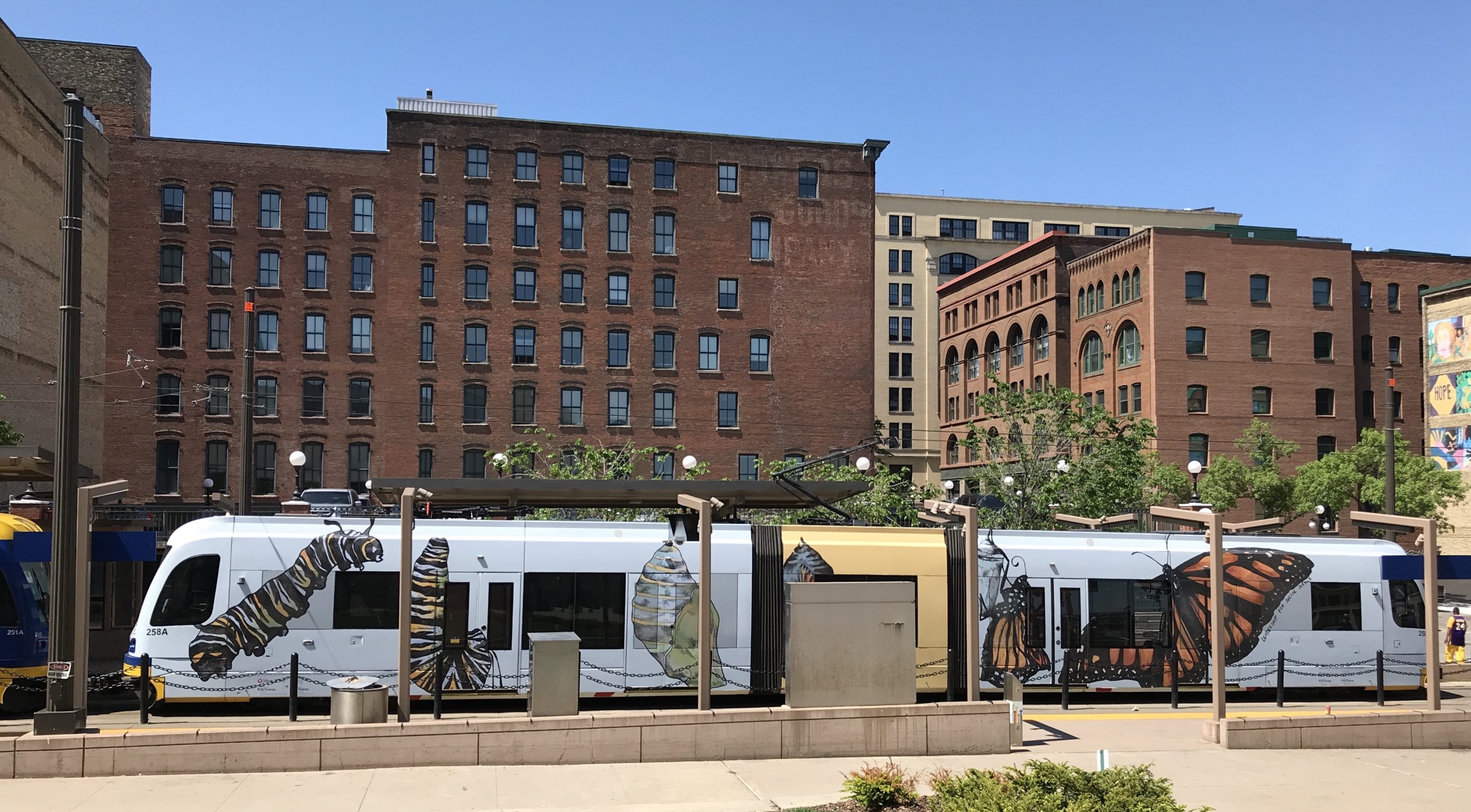
Examples of SCP Project Implementation Outcomes from Different Partners and Disciplines
SCP project topics include planning for climate resiliency, increasing transit ridership, improving water quality and water conservation, park and trail connectivity and design, analyzing energy efficiency, designing green roofs and natural playgrounds, solar power demonstrations, and many more.
In collaboration with St. Thomas Media Services, SCP created a series of 7 films that highlight a variety of disciplines and successful projects for departments and faculty to share. Every semester SCP creates and displays posters and an interactive computer touchscreen display in the main rotunda of the campus library to celebrate current partnerships and course collaborations. SCP also describes the projects, organized by partner, on the SCP website. Here are a few examples of SCP projects and outcomes:
Biology students developed the Exploring Pollinator Pathways activity guide in collaboration with SCP Artist-in-Residence to engage children (and adults) in learning about and observing pollinators on the St. Thomas Pollinator Path and in their own neighborhood (download illustrated pdf of the activity guide here). (Plants, Food, and Medicine – BIOL 315, Conversation Biology – BIOL 101 and the St. Thomas Pollinator Path). This work was also the basis for the SCP Arts exhibit at the Mississippi Watershed Management Organization, Pollinator Pathways, in Summer 2019.
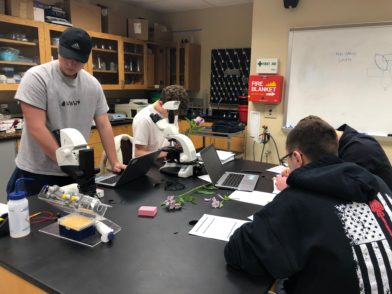
Computer science students designed a prototype app that tracks volunteer projects and hours that saved the Freshwater Society approximately $15,000 in app development costs. (User-Centered Design – CISC 321 and Freshwater Society). See the film about the project here.
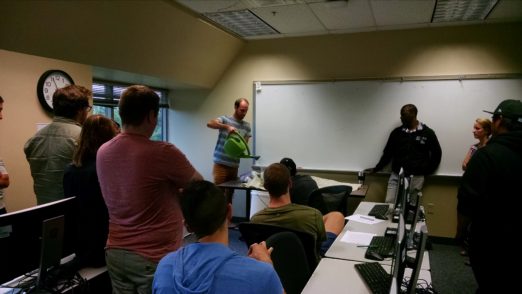
Communication & Journalism students created marketing materials to promote transit services to college students (Writing for Strategic Communication – COJO 344 and Metro Transit).

English students synthesized and analyzed themes from a climate planning workshop to develop recommendations for cities to address climate vulnerability in their community. The Metropolitan Council added this to their Local Planning Handbook, a resource for cities to plan for climate resiliency. See report here. (Environmental Writing and Community Outreach – ENGL 315 and Metropolitan Council)
Economics students analyzed pay-back periods for energy efficiency upgrades for three city buildings as well as streetlights in Delano, MN. Students presented their work to the Delano City Council. Students found that the city could save $852,000 over 10 years through basic energy efficiency upgrades. The last update for this project was that some of the students’ recommendations were included in capital spending proposals by the City Council (Economics of the Public Sector – ECON 337 and Managerial Economics – ECON 401 and City of Delano). See project film here.
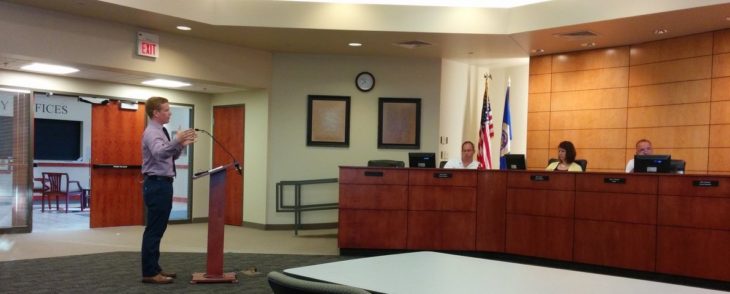
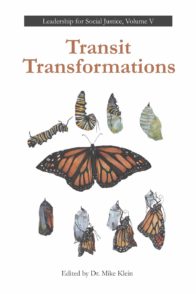
Justice and Peace Studies students conducted community-based research about the importance of transit in people’s lives with Metro Transit. Students integrated their findings into a book, Transit Transformations. Also, the visual metaphor of their key finding – that transit changed people’s lives in some way – was installed as a wrap on the Metro Transit Green Line from April 22, 2019-September 2019. In addition to an increased understanding of the importance of transit in people’s lives internally, Metro Transit uses this work to increase public support for transit. (Leadership for Social Justice – JPST 365 and Metro Transit)
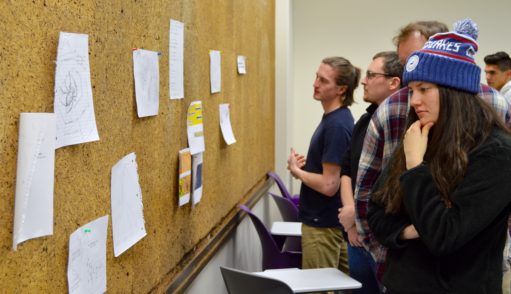
Spanish students conducted interviews with native Spanish speakers to provide feedback to improve Metro Transit’s customer satisfaction surveys (Business Spanish – SPAN 320 and Metro Transit)
Beyond course-based projects, SCP has also collaborated on the development of student research projects and research opportunities through the Center for Applied Mathematics and the Department of Economics’ DataCom competition.
Finally, St. Thomas Campus Sustainability is building on the success of SCP to implement a Campus as a Living Lab program, which will tailor and draw from the SCP model to holistically support the St. Thomas Sustainability Strategic Plan with course partnerships across campus operational departments.
SCP Contributions to the EPIC-Network
SCP has participated in the EPIC-N conference for several years. Presentations and panels have included communication strategies, SCP Arts innovation, and an upcoming workshop on adapting the EPIC Model to university mission and culture. SCP shares resources developed and mentors new staff at other member programs. In addition to EPIC-N conferences, SCP has presented about the EPIC Model at other conferences and webinars including the Association for the Advancement of Sustainability in Higher Education in 2015, the Upper Midwest Association for Campus Sustainability in 2017 and 2019, co-presented with Metro Transit in a webinar, “Impactful Transit Agency and University Collaborations“, hosted by the West Region Transportation Workforce Center and the Western Transportation Institute at Montana State, and will co-present with Metro Transit and another EPIC-N program at the upcoming ASHOKA conference in 2020. SCP also works to celebrate the EPIC-Network and its programs through social media. Finally, SCP is currently working with EPIC-N on a work group designed to increase engagement with alumni partners, faculty, and students.
